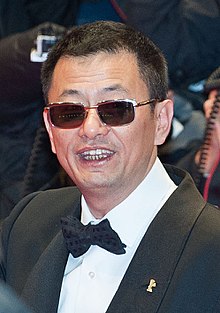Wong Kar-Wai
| Wong Kar-wai | |||||||||||
| Traditional Chinese | |||||||||||
|---|---|---|---|---|---|---|---|---|---|---|---|
| Simplified Chinese | |||||||||||
|
|||||||||||
| Transcriptions | |
|---|---|
| Standard Mandarin | |
| Hanyu Pinyin | Wáng Jiāwèi |
| Yue: Cantonese | |
| Jyutping | wong4 gaa1 wai6 |
Wong Kar-wai, BBS (born 17 July 1958) is a Hong Kong Second Wave filmmaker, internationally renowned as an auteur for his visually unique, highly stylised, emotionally resonant work, including As Tears Go By (1988), Days of Being Wild (1990), Ashes of Time (1994), Chungking Express (1994), Fallen Angels (1995), Happy Together (1997), 2046 (2004) and The Grandmaster (2013). His film In the Mood for Love (2000), starring Maggie Cheung and Tony Leung, garnered widespread critical acclaim. Wong's films frequently feature protagonists who yearn for romance in the midst of a knowingly brief life and scenes that can often be described as sketchy, digressive, exhilarating, and containing vivid imagery.
Wong Kar-wai was born on 17 July 1958 in Shanghai, the youngest of three siblings. His father was a sailor and his mother was a housewife. By the time Wong was five years old, the seeds of the Cultural Revolution were beginning to take effect in China and his parents decided to relocate to British-ruled Hong Kong. The two older children were meant to join them later, but the borders closed before they had a chance and Wong did not see his brother or sister again for ten years. In Hong Kong, the family settled in the Tsim Sha Tsui district, and his father got work managing a night club. Being an only child in a new city, and speaking only Mandarin, Wong has said he felt isolated during his childhood; he struggled to learn Cantonese and English, only becoming fluent in these new languages when he was a teenager.
...
Wikipedia

